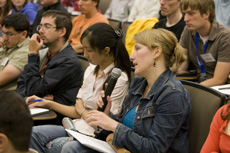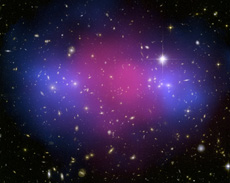|
Friday, Aug. 29
3:30 p.m.
DIRECTOR'S COFFEE BREAK - 2nd Flr X-Over
4 p.m.
Joint Experimental-Theoretical Physics Seminar - One West
Speaker: E. de la Cruz Burelo, CINVESTAV
Title: Observation of the doubly strange b baryon Omega-b
Monday, Sept. 1
Labor Day Holiday
Tuesday, Sept. 2
2:30 p.m.
Particle Astrophysics Seminar - One West (NOTE DATE and LOCATION)
Speaker: M. Sakellariadou, King's College London
Title: Dynamics of Cosmic Superstrings
3:30 p.m.
DIRECTOR'S COFFEE BREAK - 2nd Flr X-Over
THERE WILL BE NO ACCELERATOR PHYSICS AND TECHNOLOGY SEMINAR TODAY
Click here for NALCAL,
a weekly calendar with links to additional information. |
Friday, Aug. 29
- Smart cuisine: Italian vegetable soup
- Teriyaki chicken
- Southern fried chicken
- Smart cuisine: Mediterranean baked tilapia
- Eggplant parmesan panini
- Assorted slice pizza
- Assorted sub sandwich
*Smart Cuisine - Heart Healthy Choice
Wilson Hall Cafe Menu |
|
Wednesday, Sept. 3
Lunch
- Ham & gruyere crepes
- Confetti salad
- Mixed berry cobbler
Thursday, Sept. 4
Dinner
- Pasta carbonara
- Chilean sea bass w/spicy red pepper sauce
- Sautéed spinach with garlic & lemon
- Fresh fruit tart
Chez Leon Menu
Call x4598 to make your reservation. |
|
|
Hadron collider school prepares young physicists

University of Oxford graduate student and ATLAS collaborator Kristen Lohwasser asks a question during a lecture as part of the third joint CERN-Fermilab Hadron Collider Physics Summer School.
Students from around the world converged at Fermilab earlier this month in search of physics education beyond a traditional classroom.
The third session of the joint CERN-Fermilab Hadron Collider Physics Summer School, held at Fermilab Aug. 12-22, exposed young post-docs and advanced graduate students to lectures from world-renowned experts on theoretical and experimental particle physics and allowed them to interact with their international peers.
"The school went really smoothly," said school co-director Harry Cheung. "We got really good feedback from the students, who all had varying levels and types of knowledge, and they seemed to really find it useful."
Students learned about the theoretical and experimental foundations of hadron collider physics, participated in parallel discussion sections and interacted with experts. They also attended social events, including tours of Fermilab experiments, visits to the Adler Planetarium and the University of Chicago.
"The school is perfect for graduate students who have finished most of their core requirements," said Ben Thayer, a graduate student in theory from Florida State University. "It is not just the high quality of the lecturers but also the socialization - participating in discussions with peers without the formality of the classroom."
The school helped Thayer learn more about experimental physics. "It shows what I need to do as a theorist to be able to make useful predictions," Thayer said.
Fermilab scientists and school co-directors Harry Cheung and Marcela Carena received 274 applications for the school. With funding from FRA, Fermilab, CERN, NSF and a grant from the URA Visiting Scientists Scholars Program, nearly half of the 148 accepted students received financial support to attend. Nearly half of the accepted attendees were from outside the U.S.
"With the imminent advent of the LHC, the school atmosphere was especially exciting. Students asked many insightful questions, which kept the lecturers on their toes," Carena said. "Both students and lecturers agreed the school provided a unique venue to prepare young minds for discoveries at the LHC."
--Rhianna Wisniewski
|
Cluster smashup is dark matter proof

Image from Hubble Space Telescope courtesy of NASA, ESA, CXC, M. Bradac (University of California, Santa Barbara), and S. Allen (Stanford University)
From National Geographic News,
Aug. 27, 2008
If the latest image from the Hubble Space Telescope looks familiar, that's because this candy-hued galaxy cluster could be a twin of the so-called bullet cluster, a formation hailed in 2006 as the first direct proof for the existence of dark matter.
At 5.6 billion light-years from Earth, the new cluster-known as MACS J0025.4-1222-is much farther away, and thus older, than its famous relative. But the formation shows the same separation of dark and ordinary matter occurring as its two parent galaxy clusters collide at high speed.
As in the bullet cluster, a composite image from optical and x-ray telescopes shows visible matter (pink) in MACS J0025.4-1222 slowing down during the collision.
Meanwhile, most of the cluster's mass (blue) keeps up speed and passes right through the visible matter, creating two clumps that are moving away from the collision. These clumps, astronomers think, are dark matter.
Read more
|
|
|
OSG 1.0: Stable, Secure, Reliable
Open Science Grid 1.0 is here. Although scientists have been generating results on OSG resources for a couple of years using earlier versions, the VDT-based software has now reached a confident "1.0" level of stability, security and reliability.
A team at the University of Wisconsin, an institution with a long tradition of distributed computing research, leads the OSG software integration, packaging and deployment efforts, and has built all the OSG releases, including 1.0.
After multiple rigorous validation cycles in which stakeholders participated, over a dozen VOs granted the official 'Green Flag' to OSG 1.0.
"OSG 1.0 is an evolutionary, as opposed to revolutionary improvement over the previous software release," says Alain Roy, software coordinator for OSG. "It provides many updates that improve the stability and reliability of the software and the quality of information available to users and administrators."
Most important according to Roy are the reliability improvements in collection and dissemination of job statistics to provide a clear picture of real-time operation, and of site-specific parameters and restrictions to help users make decisions about where to send jobs.
"These updates improve the quality and quantity of information OSG can share with the EGEE Grid," he says. "They are of great interest to the CMS and ATLAS collaborators at the Large Hadron Collider who will rely on this information for daily operation."
Read more
-Anne Heavey, iSGTW, with Alain Roy, OSG/University of Wisconsin, and Abhishek Singh Rana, UCSD
|
Register by Sept. 5 for LHC start-up pajama party
At 1:30 a.m. on Wednesday, Sept. 10, Fermilab will host a pajama party at the LHC Remote Operations Center to watch the first beam circulate in the Large Hadron Collider. Breakfast will be served following the LHC start-up. Pajamas are optional. You must register by Friday, Sept. 5 to attend.
|
|
Have a safe day!
Weekly time sheets due today
Because of the upcoming Labor Day holiday, weekly time sheets are due in Payroll
by 10 a.m. today.
Altera's Quartus II Software Design classes
The Office for Professional and Organization Development will offer classes in Altera's Quartus II Software Design Series.
Altera's Quartus II Software Design Series: Timing Analysis - Sept. 16. Learn more and enroll.
Altera's Quartus II Software Design Series: Optimization - Sept. 17. Learn more and enroll.
The enrollment deadline for both classes is Aug. 29.
GSA triathlon Aug. 30
Fermilab's Graduate Student Association will host its annual triathlon on Saturday, Aug. 30, beginning at 7:30 a.m. The event will begin with an 800m swim in the Fermilab pool, continue with a 20km bike ride and finish with a 5km run. All events will occur on Fermilab property. Access more information on the event Web page. To sign up, e-mail the GSA Officers.
Wilson Hall closed Sept. 6
Wilson Hall and Ramsey Auditorium will be closed on Saturday, Sept. 6, between 6 a.m. and 6 p.m. for schedule maintenance on Electrical Feeder 44 and the domestic water system. All exterior doors will be secured and signs posted nearby. Contact John Kent, Wilson Hall building manager, with questions.
English country dance time change, folk festival events
English country dancing will take place this Sunday, Aug. 31, beginning at 7 p.m. The meeting time was adjusted so that the dancing will not conflict with the Fox Valley Folk Festival, which will take place on Island Park in Geneva on Sunday and Monday. On Monday, Sept. 1, the English country dancing group will also perform at the Festival in the Pavilion at 3 p.m. with "Old Fezziwig's Band." Fermilab International Folk dancers will also teach Scandinavian dance to the tunes of Chicago Spelmanslag at the festival on Aug. 31. Contact folkdance@fnal.gov or call (630) 584-0825 or (630) 840-8194 for more information. Schedules and information for the Fox Valley Folk Festival are available at www.foxvalleyfolk.com
Classifieds
Find new classified ads on Fermilab Today.
Additional Activities
|
|